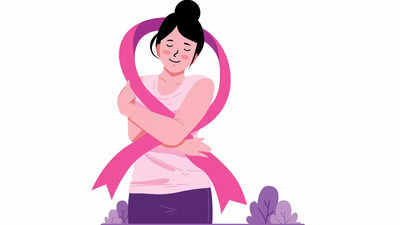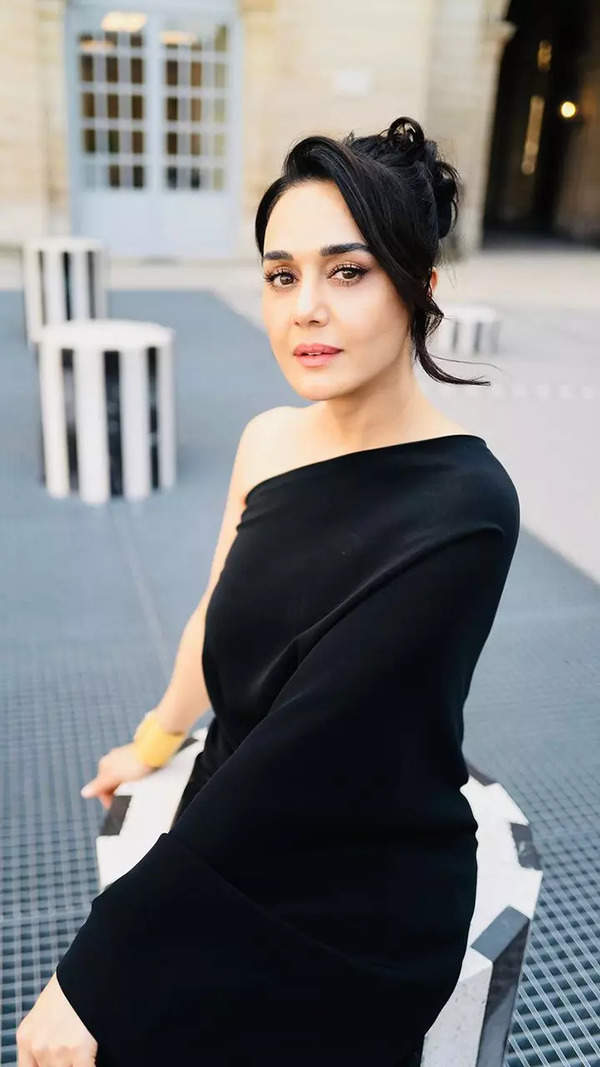- News
- lifestyle
- health-fitness
- health-news
- ‘Practise body awareness, investigate family history to detect breast cancer’
Trending
‘Practise body awareness, investigate family history to detect breast cancer’
Hina Khan, 36, recently revealed her diagnosis of Stage 3 breast cancer. Doctors share insights into the rise in breast cancer among young women and the steps needed for early detection

Normally the screening starts after the age of 40 but if there is a history of breast cancer in the family then the screening should start five years earlier, suggests Dr Amit Upadhyay
WHEN SHOULD YOU START GETTING SCREENED?
Normally the screening starts after the age of 40 but if there is a history of breast cancer in the family then the screening should start five years earlier, suggests Dr Amit Upadhyay Senior Consultant, Oncology & HematoOncology, PSRI Hospital
■ It is recommended to dobiennial mammography screenings for those in the age group 40-50 and annually thereafter for women with average risk
■ Women with a higher riskprofile may benefit from early screening
■ Early detection and personalised multidisciplinary management are crucial in treating breast cancer effectively— Dr Ramesh Sarin

Early symptoms that should not be ignored
■ A lump in the breast orunderarm
■ Changes in the shape and size of the breast
■ Recent onset nipple inversion
■ Changes in the colour ortexture of the breast skin
■ Any lump in the armpit (axilla)
— Dr Arun Kumar Goel, Chairman& Head, Surgical Oncology, Andromeda Cancer Hospital
‘AGE IS A SIGNIFICANT FACTOR IN BREAST CANCER DEVELOPMENT’
Dr Ramesh Sarin, Senior Consultant, Surgical Oncologist, Indraprastha Apollo Hospital, explains that the risk of breast cancer increases as women age, with most cases occurring in women over 55.“However, breast cancer in young women tends to be more aggressive and diagnosed at advanced stages. Early detection and screening are crucial for young women with a higher risk profile, such as those with a family history or genetic predisposition,” she adds.
The median age of presentation at diagnosis is 49 years in India, as against 62 in the Western population, shares Dr Divya Sehra, Consultant Gynecologic Oncology, Manipal Hospital, Dwarka. “The incidence varies widely within India too, being higher in metropolitan cities like Delhi and Mumbai, mainly due to reproductive factors (late marriage, delayed childbearing, low rates of breastfeeding) and lifestyle factors (sedentary life, red meat-based diet, tobacco, and alcohol consumption),” she adds.
‘CANCER IN INDIAN WOMEN OCCURS TEN YEARS EARLIER THAN IN WEST’
In 2023, a study based on data from 1.5 lakh screenings by Apollo Hospitals between 2018 and 2023, found out that a striking 25% of breast cancer cases among Indian women occurred at the age of 39 years or less. The recorded minimum age at the time of breast cancer diagnosis is 23 years.
“Research from ICMR and Tata Memorial indicates that in the last 10-15 years, cancer in India in women occurs ten years earlier than their Western counterpart. For women under 40 years of age, the incidence is double to what it is in the West. This trend is attributed to various factors, including genetics, family history, and lifestyle choices,” points out Dr Ramesh Sarin.
Normally the screening starts after the age of 40 but if there is a history of breast cancer in the family then the screening should start five years earlier, suggests Dr Amit Upadhyay Senior Consultant, Oncology & HematoOncology, PSRI Hospital
■ It is recommended to dobiennial mammography screenings for those in the age group 40-50 and annually thereafter for women with average risk
■ Women with a higher riskprofile may benefit from early screening
■ Consult a healthcare provider to determine the appropriate screening schedule based on individual risk factors and medical history
■ Early detection and personalised multidisciplinary management are crucial in treating breast cancer effectively— Dr Ramesh Sarin

Hina Khan recently shared that she has Stage 3 breast cancer
Early symptoms that should not be ignored
■ A lump in the breast orunderarm
■ Changes in the shape and size of the breast
■ Recent onset nipple inversion
■ Changes in the colour ortexture of the breast skin
■ Any lump in the armpit (axilla)
— Dr Arun Kumar Goel, Chairman& Head, Surgical Oncology, Andromeda Cancer Hospital
‘AGE IS A SIGNIFICANT FACTOR IN BREAST CANCER DEVELOPMENT’
Dr Ramesh Sarin, Senior Consultant, Surgical Oncologist, Indraprastha Apollo Hospital, explains that the risk of breast cancer increases as women age, with most cases occurring in women over 55.“However, breast cancer in young women tends to be more aggressive and diagnosed at advanced stages. Early detection and screening are crucial for young women with a higher risk profile, such as those with a family history or genetic predisposition,” she adds.
The median age of presentation at diagnosis is 49 years in India, as against 62 in the Western population, shares Dr Divya Sehra, Consultant Gynecologic Oncology, Manipal Hospital, Dwarka. “The incidence varies widely within India too, being higher in metropolitan cities like Delhi and Mumbai, mainly due to reproductive factors (late marriage, delayed childbearing, low rates of breastfeeding) and lifestyle factors (sedentary life, red meat-based diet, tobacco, and alcohol consumption),” she adds.
‘CANCER IN INDIAN WOMEN OCCURS TEN YEARS EARLIER THAN IN WEST’
In 2023, a study based on data from 1.5 lakh screenings by Apollo Hospitals between 2018 and 2023, found out that a striking 25% of breast cancer cases among Indian women occurred at the age of 39 years or less. The recorded minimum age at the time of breast cancer diagnosis is 23 years.
“Research from ICMR and Tata Memorial indicates that in the last 10-15 years, cancer in India in women occurs ten years earlier than their Western counterpart. For women under 40 years of age, the incidence is double to what it is in the West. This trend is attributed to various factors, including genetics, family history, and lifestyle choices,” points out Dr Ramesh Sarin.
End of Article
FOLLOW US ON SOCIAL MEDIA








